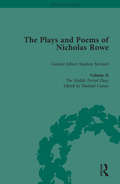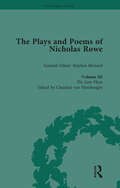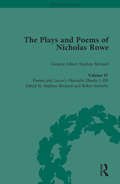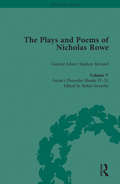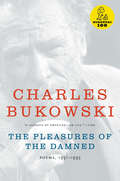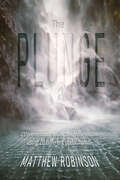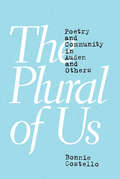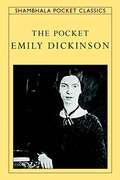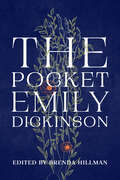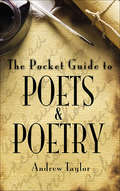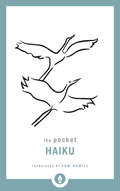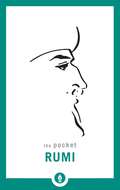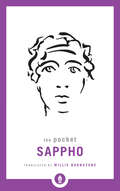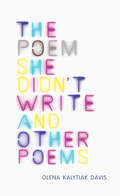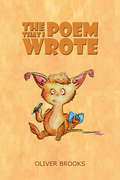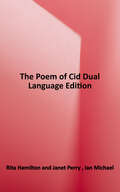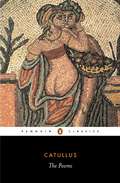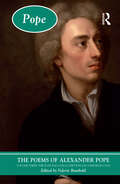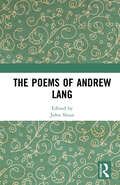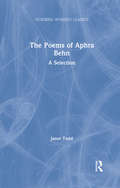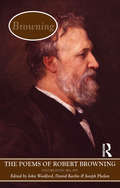- Table View
- List View
The Plays and Poems of Nicholas Rowe, Volume II: The Middle Period Plays (The Pickering Masters)
by Michael CainesNicholas Rowe was the first Poet Laureate of the Georgian era. A fascinating and important yet largely overlooked figure in eighteenth-century literature, he is the ‘lost Augustan’. His plays are important both for the way they address the political and social concerns of the day and for reflecting a period in which the theatre was in crisis. This edition sets out to demonstrate Rowe’s mastery of the early eighteenth century theatre, especially his providing significant roles for women, and examines the political and historical stances of his plays. It also highlights his work as a translator, which was both innovative and deeply in tune with current practices as exemplified by John Dryden and Alexander Pope. This is the first scholarly edition of all Rowe’s plays and poems and is accompanied by 15 musical scores and 31 black and white illustrations. In this second volume the middle plays, The Biter, Ulysses, and The Royal Convert are presented, along with a newly written explanatory introduction by Michael Caines which precedes the full edited text. Appendices covering dedications, prologues and epilogues, performance history, the related music and textual apparatus are also included. A consolidated bibliography is included with the final volume for ease of reference.
The Plays and Poems of Nicholas Rowe, Volume III: The Late Plays (The Pickering Masters)
by Stephen Bernard Claudine Van HensbergenNicholas Rowe was the first Poet Laureate of the Georgian era. A fascinating and important yet largely overlooked figure in eighteenth-century literature, he is the ‘lost Augustan’. His plays are important both for the way they address the political and social concerns of the day and for reflecting a period in which the theatre was in crisis. This edition sets out to demonstrate Rowe’s mastery of the early eighteenth century theatre, especially his providing significant roles for women, and examines the political and historical stances of his plays. It also highlights his work as a translator, which was both innovative and deeply in tune with current practices as exemplified by John Dryden and Alexander Pope. This is the first scholarly edition of all Rowe’s plays and poems and is accompanied by 15 musical scores and 31 black and white illustrations. In this third volume the late plays, The Tragedy of Jane Shore and The Tragedy of the Lady Jane Grey are presented, along with a newly written explanatory introduction by Claudine van Hensbergen which precedes the full edited text. Appendices covering performance history, the related music and textual apparatus are also included. A consolidated bibliography is included with the final volume for ease of reference.
The Plays and Poems of Nicholas Rowe, Volume IV: Poems and Lucan’s Pharsalia (Books I-III) (The Pickering Masters)
by Robin Sowerby Stephen BernardNicholas Rowe was the first Poet Laureate of the Georgian era. A fascinating and important yet largely overlooked figure in eighteenth-century literature, he is the ‘lost Augustan’. His plays are important both for the way they address the political and social concerns of the day and for reflecting a period in which the theatre was in crisis. This edition sets out to demonstrate Rowe’s mastery of the early eighteenth century theatre, especially his providing significant roles for women, and examines the political and historical stances of his plays. It also highlights his work as a translator, which was both innovative and deeply in tune with current practices as exemplified by John Dryden and Alexander Pope. This is the first scholarly edition of all Rowe’s plays and poems and is accompanied by 15 musical scores and 31 black and white illustrations. In this fourth volume his poetry and the first part of his translation of Lucan's Pharsalia, described by Samuel Johnson as one of the greatest productions in English poetry, is presented. A newly written explanatory introduction by Stephen Bernard to the poems, and by Robin Sowerby to the Pharsalia, precedes each of full edited texts. The second part of the text and textual apparatus are included with the fifth volume of this edition. A consolidated bibliography is also included with the final volume for ease of reference.
The Plays and Poems of Nicholas Rowe, Volume V: Lucan’s Pharsalia (Books IV-X) (The Pickering Masters)
by Lucan’s PharsaliaNicholas Rowe was the first Poet Laureate of the Georgian era. A fascinating and important yet largely overlooked figure in eighteenth-century literature, he is the ‘lost Augustan’. His plays are important both for the way they address the political and social concerns of the day and for reflecting a period in which the theatre was in crisis. This edition sets out to demonstrate Rowe’s mastery of the early eighteenth century theatre, especially his providing significant roles for women, and examines the political and historical stances of his plays. It also highlights his work as a translator, which was both innovative and deeply in tune with current practices as exemplified by John Dryden and Alexander Pope. This is the first scholarly edition of all Rowe’s plays and poems and is accompanied by 15 musical scores and 31 black and white illustrations. In this final volume the second part of his translation of Lucan’s Pharsalia, described by Samuel Johnson as one of the greatest productions in English poetry, is presented along with some his own original poetry. A newly written explanatory introduction to the Pharsalia by Stephen Bernard precedes the full edited text in volume IV. Appendices covering the related music and textual apparatus are also included. The edition comes with a consolidated bibliography for ease of reference.
The Pleasures of the Damned: Poems, 1951-1993
by Charles BukowskiTo his legions of fans, Charles Bukowski was--and remains--the quintessential counterculture icon. A hard-drinking wild man of literature and a stubborn outsider to the poetry world, he wrote unflinchingly about booze, work, and women, in raw, street-tough poems whose truth has struck a chord with generations of readers.Edited by John Martin, the legendary publisher of Black Sparrow Press and a close friend of Bukowski's, The Pleasures of the Damned is a selection of the best works from Bukowski's long poetic career, including the last of his never-before-collected poems. Celebrating the full range of the poet's extraordinary and surprising sensibility, and his uncompromising linguistic brilliance, these poems cover a rich lifetime of experiences and speak to Bukowski's "immense intelligence, the caring heart that saw through the sham of our pretenses and had pity on our human condition" (New York Quarterly). The Pleasures of the Damned is an astonishing poetic treasure trove, essential reading for both longtime fans and those just discovering this unique and legendary American voice.
The Plunge: 120 poems about nature, love, loss, and life, using 28 different poetic forms
by Matthew RobinsonMatthew Robinson’s collection The Plunge features 120 poems about love, loss, life, nature, and other topics. The poems include free writes as well as 28 other poetic forms. While some poems focus on the minutiae of life, such as ‘The Bee’ and ‘Butterfly’, others take you around the world, such as ‘Forever in Mozambique’ and ‘Antarctica’. There are deep and profound life lessons offered within, but also songs of love sung across the pages. These are Robinson’s favorites amongst his poems, written over more than five years!
The Plural of Us: Poetry and Community in Auden and Others
by Bonnie CostelloThe Plural of Us is the first book to focus on the poet’s use of the first-person plural voice—poetry’s “we.” Closely exploring the work of W. H. Auden, Bonnie Costello uncovers the trove of thought and feeling carried in this small word. While lyric has long been associated with inwardness and a voice saying “I,” “we” has hardly been noticed, even though it has appeared throughout the history of poetry. Reading for this pronoun in its variety and ambiguity, Costello explores the communal function of poetry—the reasons, risks, and rewards of the first-person plural.Costello adopts a taxonomic approach to her subject, considering “we” from its most constricted to its fully unbounded forms. She also takes a historical perspective, following Auden’s interest in the full range of “the human pluralities” in a time of particular pressure for and against the collective. Costello offers new readings as she tracks his changing approach to voice in democracy. Examples from many other poets—including Walt Whitman, T. S. Eliot, Elizabeth Bishop, and Wallace Stevens—arise throughout the book, and the final chapter offers a consideration of how contemporary writers find form for what George Oppen called “the meaning of being numerous.”Connecting insights to philosophy of language and to recent work in concepts of community, The Plural of Us shows how poetry raises vital questions—literary and social—about how we speak of our togetherness.
The Pocket Book of Ogden Nash
by Ogden NashAn anthology of Nash's best and most famous poems, his hilarious grouches, unflinching puns, and indescribable rhymes.
The Pocket Emily Dickinson
by Emily Dickinson Brenda HillmanConsidered by many to be the spiritual mother of American poetry, Emily Dickinson (1830–1886) was one of the most prolific and innovative poets of her era. Well-known for her reclusive personal life in Amherst, Massachusetts , her distinctively short lines, and eccentric approach to punctuation and capitalization, she completed over seventeen hundred poems in her short life. Though fewer than a dozen of her poems were actually published during her lifetime, she is still one of the most widely read poets in the English language. Over one hundred of her best poems are collected here.
The Pocket Emily Dickinson
by Emily DickinsonConsidered by many to be the spiritual mother of American poetry, Emily Dickinson (1830–1886) was one of the most prolific and innovative poets of her era. Well-known for her reclusive personal life in Amherst, Massachusetts , her distinctively short lines, and eccentric approach to punctuation and capitalization, she completed over seventeen hundred poems in her short life. Though fewer than a dozen of her poems were actually published during her lifetime, she is still one of the most widely read poets in the English language. Over one hundred of her best poems are collected here.
The Pocket Guide to Poets and Poetry (Pocket Guides)
by Andrew TaylorContinuing the success of the Pocket Guide series, Andrew Taylors Pocket Guide to Poets and Poetry starts with a history of poetry, setting the poets and their work in the context of their time and the influence of their work including political agenda, festivities and historical celebrations and their chosen genre. The poets are reviewed with their individual biographies, including their genre and best works. A must for everyone interested in poetry, those looking for more information about their favorite poets, as well as seeking to discover new favorites. It will also appeal to collectors of the Pocket Guide series by Remember When which includes The Pocket Guide to the Classics and The Pocket Guide to Plays and Playwrights.
The Pocket Haiku (Shambhala Pocket Library)
by Translated by Sam HamillQuintessential classical Japanese haiku--selected and translated by one of America's premier poet-translators--now available in a pocket edition.In this collection of haiku, translator Sam Hamill has compiled the best from the tradition, spanning the sixteenth through nineteenth centuries, with particular focus on the three great masters: Bashō, Buson, and Issa. Based on images from nature, the poems address the themes of joy, temporality, beauty, wonder, loneliness, and loss. Haiku may be the most popular and widely recognizable poetic form in the world. In just three lines a great haiku presents a crystalline moment of image, emotion, and awareness. Elements of compassion, silence, and a sense of temporality often combine to reveal a quality of mystery. Just as often, haiku may bring a startling insight into the ordinary, or a flash of humor. Collected here are over two hundred of the best haiku of Japanese literature--written by the great masters of the genre.The featured poets are Bashō, Buson, Issa, Moritake, Sōin, Sanpū, Kikaku, Ransetsu, Kyorai, Raizan, Kakei, Onitsura, Taigi, Chiyo, Sogetsuni, Sogi, Fuhaku, Teiga, Kikusha-ni, Tayo-jo, Sōchō, Shōha, and Shiki. This is a pocket-size reissue of The Sound of Water (Shambhala, 1995).
The Pocket Rumi
by Kabir Helminski Mevlana Jalaluddin RumiThe cry of the soul in love with God has never been more eloquently expressed than by the great Persian Sufi master Jalaluddin Rumi (1207-1273). Readers have thrilled to his ecstatic songs of divine union for more than eight hundred years. Here is a collection of the best of Rumi's poetry.
The Pocket Sappho (Shambhala Pocket Library)
by Willis BarnstoneA vivid, contemporary translation of the greatest Greek love poet by the prize-winning poet and translator.Sappho’s lyric love poems, composed in the seventh century B.C.E., transcend time and place and continue to enchant readers today. Though her extant work consists only of a collection of fragments and a handful of complete poems, the passionate elegance of her musings on life and death, loss and longing, desire, and nature speak volumes.Willis Barnstone’s vivid, contemporary translation, along with his introduction and notes, sheds new light on the spirit and mystique of this ancient Greek poet.This edition is an abridgment of The Complete Poems of Sappho.
The Poem Electric: Technology and the American Lyric
by Seth PerlowAn enlightening examination of the relationship between poetry and the information technologies increasingly used to read and write it Many poets and their readers believe poetry helps us escape straightforward, logical ways of thinking. But what happens when poems confront the extraordinarily rational information technologies that are everywhere in the academy, not to mention everyday life?Examining a broad array of electronics—including the radio, telephone, tape recorder, Cold War–era computers, and modern-day web browsers—Seth Perlow considers how these technologies transform poems that we don&’t normally consider &“digital.&” From fetishistic attachments to digital images of Emily Dickinson&’s manuscripts to Jackson Mac Low&’s appropriation of a huge book of random numbers originally used to design thermonuclear weapons, these investigations take Perlow through a revealingly eclectic array of work, offering both exciting new voices and reevaluations of poets we thought we knew.With close readings of Gertrude Stein, Frank O&’Hara, Amiri Baraka, and many others, The Poem Electric constructs a distinctive lineage of experimental writers, from the 1860s to today. Ultimately, Perlow mounts an important investigation into how electronic media allows us to distinguish poetic thought from rationalism. Posing a necessary challenge to the privilege of information in the digital humanities, The Poem Electric develops new ways of reading poetry, alongside and against the electronic equipment that is now ubiquitous in our world.
The Poem Is You
by Stephen BurtThe variety of contemporary American poetry leaves many readers overwhelmed. The critic, scholar, and poet Stephen Burt sets out to help. Beginning in the early 1980s, where critical consensus ends, he presents 60 poems, each with an original essay explaining how the poem works, why it matters, and how it speaks to other parts of art and culture.
The Poem She Didn't Write and Other Poems
by Olena Kalytiak DavisHonored as one of "Nine Great Poetry Books of 2014"--The New Yorker "The Poem She Didn't Write is a breakup book, full of the kinds of invective and taunts honed by a person who has spent, as all of us have now spent, infinite hours online. Its complex tones arise from the poet's wanting equally to seduce and to repel a lover whose deepening silence only provokes rhetorical escalation. The effect can be like reading e-mails in someone's drafts folder--but who wouldn't want to read Davis's drafts?"--Dan Chaisson, The New Yorker "Davis' first full collection in a decade should be stamped with the warning, 'Buckle up!,' because entering this writer's mind is one wild ride of digression, mutation, and syntactical and typographical experimentation... Davis has clearly put the poetic rule book through a shredder, and there's much to appreciate about that."--Booklist"There is an eerie precision to her work--like the delicate discernment of a brain surgeon's scalpel--that renders each moment in both its absolute clarity and ultimate transitory fragility."--Rita DoveIn her first full collection in a decade, Olena Kalytiak Davis revivifies language and makes love offerings to her beloved reader. With a heightened post-confessional directness, she addresses lost love, sexual violence, and the confrontations of aging. In her characteristic syntactical play, sly slips of meaning, and all-out feminism, Davis hyperconsciously erases the rulebook in this memorable collection.From "The Poem She Didn't Write":beganwhen she stoppedbegan in winter and, like everything else, at first, just waited for springin spring noticed there were lilac branches, but no desire,no need to talk to any angel, to say: sky, dooryard, _______,when summer arrived there was more, but not muchnothing really worth notingand then it was winter again--nothing had changed: sky, dooryard, ________, white,frozen was the lake and the lagoon, some froze the ocean(now you erase that) (you cross that out)and so on and so forth . . . Olena Kalytiak Davis is a first-generation Ukrainian American who was born and raised in Detroit, Michigan. Educated at Wayne State University, the University of Michigan Law School, and Vermont College, she is the author of three books of poetry. She currently works as a lawyer in Anchorage, Alaska.
The Poem That I Wrote
by Oliver Brooks"You've probably never thought about the many ingredients that go into writing. THE POEM THAT I WROTE explores the process we all travel when creating. From the brain that sends the visuals, down to the hand that guides the pen, that letters the book which contains the paper... All these steps created this book, and the one the next to it, and the one next to that, and the ones a bazillion miles away! They even helped create this very blurb."
The Poem of the Cid
by Janet Perry Rita HamiltonOne of the finest epic poems, and the only one to have survived from medieval Spain, The Poem of the Cid recounts the adventures of the warlord and nobleman Rodrigo Diaz de Vivar - 'Mio Cid'. A forceful combination of heroic fiction and historical fact, the tale seethes with the restless, adventurous spirit of Castille, telling of the Cid's unjust banishment from the court of King Alfonso, his victorious campaigns in Valencia, and the crowning of his daughters as queens of Aragon and Navarre - the high point of his career as a warmonger. An epic that sings of universal human values, this is one of the greatest of all works of Spanish literature.
The Poems (Classics Ser.)
by CatullusOne of the most versatile of Roman poets, Catullus wrote verse of an almost unparalleled diversity and stylistic agility, from the brevity of the epigram to the sustained elegance of the elegy. This collection contains all of Catullus' extant work and includes his lyrics to the notorious Clodia Metelli - married, seductive and corrupt - charting the course from rapturous delight in a new affair to the torment of love gone sour; poems to his young friend Iuventius; and longer verse, such as the extraordinary tale of Attis, a Greek youth who castrates himself in a fit of religious ecstasy. Ranging from the tender, moving and passionate to the vicious and even obscene, these are poems of astonishingly modern force and content.
The Poems (The New Cambridge Shakespeare)
by William Shakespeare edited by John RoeThis is a fully annotated edition of all the poems which are now generally regarded as Shakespeare's, excluding the Sonnets. It contains Venus and Adonis, The Rape of Lucrece, The Phoenix and the Turtle, The Passionate Pilgrim, and A Lover's Complaint. The introduction to the two long narrative poems examines their place within the classical and Renaissance European traditions, an issue which also applies to The Phoenix and the Turtle. John Roe analyses the conditions in which the collection was produced, and weighs the evidence for and against Shakespeare's authorship of A Lover's Complaint and the much-debated question of its genre. He demonstrates how in his management of formal tropes Shakespeare, like the best Elizabethans, fashions a living language out of handbook oratory. This updated edition contains a new introductory section on recent critical interpretations and an updated reading list.
The Poems of Alexander Pope: The Dunciad (1728) & The Dunciad Variorum (1729) (Longman Annotated English Poets)
by Valerie RumboldAlexander Pope (1688–1744) is one of the greatest poets in European literature, comparable to the likes of likes of Shakespeare, Chaucer, Keats and Wordsworth. He is not easy to read though: his poetry uses dense literary and contemporary contextual allusions. This is why a book that gets the readers to the meaning of his poetry as painlessly as possible is so important.This volume features the complete text of Pope’s most significant poem, The Dunciad. The first-rate annotations that accompany this edition of the poem provide information on matters of interpretation and give details of allusions that might prove baffling to the contemporary reader.
The Poems of Andrew Lang
by John SloanAndrew Lang (1844–1912) made his name in the last quarter of the Victorian era in a remarkable number of literary and intellectual fields, as popular poet, influential literary critic, editor of the classic series of Fairy Books for the young, and as author of groundbreaking books on anthropology, Homeric scholarship, folklore and history. This is the first annotated edition of Lang’s poems, bringing together his books of verse and over 150 additional poems, many of them collected for the first time.John Sloan’s introduction provides a compelling account of Lang’s achievements as a poet whose first two books of verse, Ballads and Lyrics of Old France and Ballades in Blue China, were a harbinger of the English aesthetic movement. Lang helped to create an abiding interest in French poetry and to encourage a new spirit of literary cosmopolitanism in England. He also widened the appeal of poetry in an age of new knowledge, advancing literacy and the growth of the popular press. The authoritative text is accompanied by extensive notes identifying important allusions and significant connections between the poems and Lang’s other writings. In the headnote to each poem, the reader will find a record of publication history, textual variants and sources, including details of the original sources of Lang’s verse translations from the French, Greek and Latin.The edition offers an invaluable guide to the study of Lang’s poetry for students and scholars of nineteenth-century British poetry.
The Poems of Aphra Behn: A Selection (Pickering Women's Classics)
by Janet ToddAphra Behn (1640-89) was a popular poet, author of the influential novel Oroonoko, and one of the most successful dramatists of the Restoration theater. Behn led an unusually active and eventful life for a woman of her era, traveling widely--to Surinam in 1663 and to Antwerp in 1666, where Charles II sent her as a spy during the Anglo-Dutch war. Returning to England she spent some time in a debtor's prison and subsequently devoted herself to writing, publishing numerous poems and almost twenty plays between 1670 and 1689. Because of the overtly political nature of her work, much of Behn's writing appeared anonymously and in many different versions. The Poetry of Aphra Behn is the first accessible reprinting of Aphra Behn's verses since the seventeenth century. Encompassing the entirety of her oeuvre, from satirical writings to songs, love poems, and verse epistles, the book is a testament to the life and mind of a remarkable woman.
The Poems of Browning: 1862 - 1871 (Longman Annotated English Poets)
by Joseph Phelan John Woolford Daniel KarlinThe Poems of Robert Browning is a multi-volume edition of the poetry of Robert Browning (1812 -1889) resulting from a completely fresh appraisal of the canon, text and context of his work. The poems are presented in the order of their composition and in the text in which they were first published, giving a unique insight into the origins and development of Browning's art. Annotations and headnotes, in keeping with the traditions of Longman Annotated English Poets, are full and informative and provide details of composition, publication, sources and contemporary reception. Volumes one (1826-1840) and two (1841-1846) presented the poems from his Browning's early years, while volume three (1847-61) covered the period of his marriage to Elizabeth Barrett and residence in Italy. Volume four (1862-71) deals with the decade following Elizabeth's death and Browning's return to England. These years saw the appearance of some of his most significant work, and a steady rise in his critical reputation. In Dramatis Personae (1864), Browning uses his characteristic "dramatic" mode to expose predicaments of thought and feeling, in characters ranging from Shakespeare's Caliban to the cheating medium, "Mr Sludge"; other poems dramatize Browning's complicated feelings about the deceptions and self-deceptions of romantic love. Balaustion's Adventure (1871) is an engaging reworking of Euripides' Alcestis, whose theme, the resurrection of a beloved lost wife, has poignant personal resonance for Browning;while Prince Hohenstiel-Schwangau, published in the same year, offers a thinly-veiled account of the life and actions of Napoleon III, the recently deposed Emperor of France, over whom Browning and Elizabeth had quarrelled. In these two long poems, Browning can be seen engaged in the dialogue with Elizabeth that was to shape much of his work during the remainder of his writing life.
